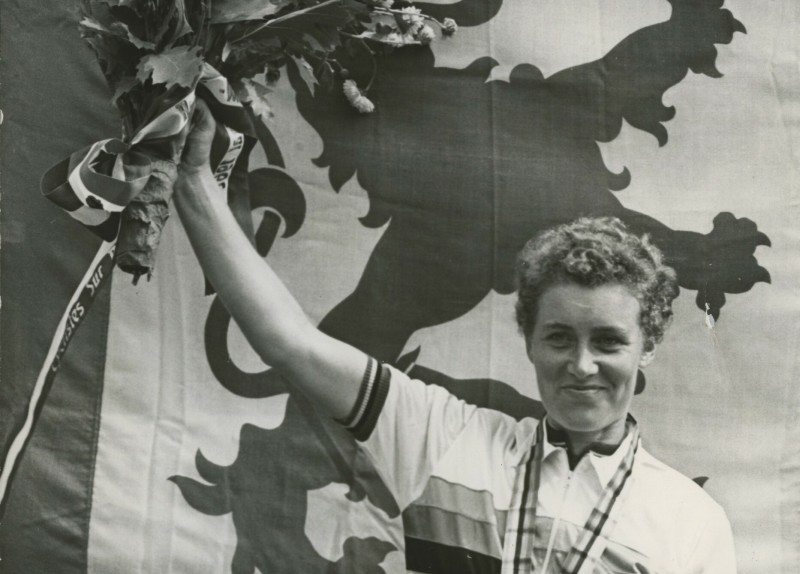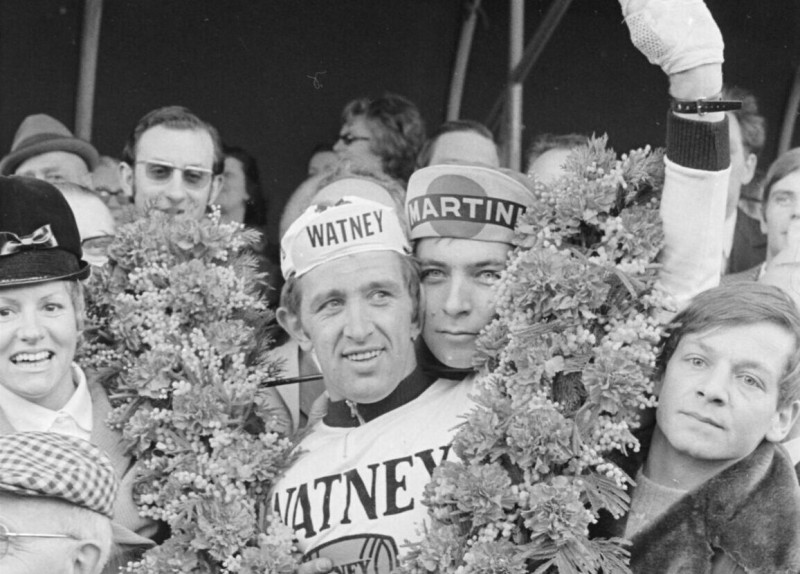Forecasters made it clear that the 1974 World Championship would be anything but a casual Sunday ride and would be among the toughest post-war editions. On 25 August the seventy selected professional cyclists faced 21 laps of 12.5 km in the centre of the Canadian city Montreal. A title race with a total distance of 262.5 km.
Besides climbs like the gruelling ascent of Springdale Street, the road to the university campus and the two-kilometre climb of Mont Royal, the course also included descents with lots of hairpin turns.
Mont Royal will require sweat!
The participants would barely have time to recuperate during the race. ‘’With the exception of the 700-metre-long final stretch before the finish, we were unable to discover a strip of only two hundred metres flat anywhere along the entire route,‘’ Jan Cornand, journalist at Het Volk, wrote in a commentary ahead of the race. This World Championships, which was to find Felice Gimondi’s successor, had everything to be a gruelling race.
The participants came from 15 nations. A new set of rules allowed the country of the outgoing world champion to appoint an extra cyclist. Gimondi's rainbow jersey in Barcelona allowed Italy to travel to Canada with a selection of 11 riders. In addition to the defending champion, this selection included several strong contenders such as Francesco Moser, Franco Bitossi and national champion Enrico Paolini.
The other main contenders were Belgium, Spain, France and the Netherlands with 10 riders each. Joop Zoetemelk and Hennie Kuiper were key absentees amongst the Dutch. Zoetemelk had suffered a very serious fall during the French stage race Midi Libre and did not resume competition until spring 1975.
Kuiper still had to take part in the Grand Prix of Dortmund in the run-up to the World Championships for his German team Rokado and was therefore unable to fly to Canada with the Dutch team. He later left for Montreal. The KNWU, the Dutch cycling federation, was not pleased that Kuiper had not shown up for the flight together with his selected compatriots. He was immediately dropped from the Dutch team and replaced by reserve Jos Schipper.
The Belgian team was divided into three camps: one led by Merckx, the other by Maertens and a third consisting of various individuals whom didn’t owe any allegiance to either Molteni or Flandria. This division was mainly due to the outcome of the previous World Championship, but team interests also played an important role. Merckx had one clear ambition: to reclaim the title of world champion. Of the ten Belgians participating in the men's race, two were his teammates at Molteni. The assignment for Joseph Bruyère and Ludo Delcroix was clear: ensure that Merckx emerged victorious once again.
Anything is possible in a World Championship. The past has proven that often enough.
The Flandria team had two riders, with Ronald De Witte tasked with supporting Freddy Maertens. Brooklyn relied on Roger De Vlaeminck and Patrick Sercu, who made his debut at the Road World Championships at the age of 30. It was no surprise that the West Fleming was selected. He had won three stages and the green jersey in the Tour that year, as well as three stages in the Giro. Then there were the lone riders: Herman Vanspringel (MIC), Roger Swerts (IJsboerke) and Frans Verbeeck (Watney-Maes).
In 1974, the World Championships of 1973 in Barcelona still weighed heavily on the minds of the Belgians. In 1973 Eddy Merckx was the top favorite, while Freddy Maertens was an emerging talent to watch. In the final, Merckx broke away from the leading group. Shortly afterwards, Maertens also attacked, riding solo to catch Merckx and staying on his wheel.
Montreal must not become Barcelona!
Moments later, Italian Felice Gimondi and Spaniard Luis Ocaña joined the Belgian leaders. The four stayed together until the finish. Maertens led out the sprint for Merckx, but his speed was so high that The Cannibal couldn't pass him. Instead, Gimondi managed to slip by and became world champion. Maertens took second, Ocaña third, and Merckx finished fourth.
The outcome of this men's road race reverberated throughout the Belgian national media, overshadowing the women's world title won by their compatriot Nicolle Van den Broeck. Merckx remained convinced that he would have become world champion if Maertens hadn't started the chase. Heated debates ensued between supporters of the two Belgian protagonists. The two competitors didn’t reconcile until several decades later.
Failure wasn't an option for the Belgian team, a repeat of the 1973 World Championships would have been the worst-case scenario. As often happens, a number of riders, including Frenchman Francis Campaner, broke away early. However, the race didn’t truly open up until the 12th lap, just past the halfway point. The Italians, with Moser, Panizza, and Bitossi, led the peloton along with Merckx, Vanspringel, and Maertens.
Once all the early escapees were caught, Bernard Thévenet launched an attack. In just one lap, he built up a lead of almost a minute and a half. Freddy Maertens and Constantino Conti set off in pursuit of the Frenchman. Although they couldn't catch Thévenet, they stayed out of the peloton's grip. With a Belgian at the front, Merckx found himself trapped. The accord after the 1973 World Championships was that no Belgian would chase down a compatriot.
What subsequently happened to Freddy Maertens caused an unexpected turn of events. "Jef D'Hont was my carer. He had prepared a coolbox for me with my drinks," Maertens recounted in his biography about the World Championships in Montreal. "When I got to the boxes after a certain lap, Jef had disappeared. Twice during the provisioning, I received a water bottle from Gust Naessens, the soigneur who had come along with some other cyclists."
"I gulped the drink greedily. A lap later, I got cramps." Severe diarrhea forced Maertens to abandon the race. Years later, Gust Naessens confessed to Maertens what had happened that day in Canada: "I gave you serious trouble there. I put some laxative in your water bottle."
I gave it my all
Maertens' elimination set the stage for Merckx. Alongside a rock-solid Vanspringel, he began the chase for Conti and Thévenet. The Italian was quickly caught. Vanspringel said he rode his heart out to close the gap on the Frenchman. Thévenet, who had a 36-second lead at the start of the final lap and had been riding alone at the front for 120 km, was caught 6 km from the finish.
On the final climb of Mont Royal, Eddy Merckx unleashed his devils and launched a smashing attack. Only Raymond Poulidor managed to follow and catch up. The two leaders rode together toward the finish line on Boulevard Edouard Montpetit.
During the sprint, Merckx got out of the saddle twice to accelerate, which was enough to leave the 38-year-old Frenchman behind and secure the World Championship title once again. Poulidor, living up to his nickname of "Eternal Second", had to settle for the silver medal. The bronze went to another Frenchman, Mariano Martinez.
The Cannibal, who had already triumphed in the 1964 World Championships among amateurs, captured his third rainbow jersey among professional cyclists in Montreal. Until then, only Alfredo Binda and Rik Van Steenbergen had won the Road World Championships three times as professionals. With his victory in Canada, Merckx joined these legends as a record holder. In the years to come, only Spaniard Oscar Freire and Slovak Peter Sagan would also succeed.
In the spring of 1974, Merckx was far from his peak. He had won no classics. But come summer, he showed he still had plenty left in the tank. He did win the Giro, the Tour of Switzerland, the Tour de France, and the World Championship, results that eclipsed the critics who said he was on his last pedal strokes.
In Montreal, the racing was intense from start to finish. The French team delivered an unexpectedly strong performance. Campaner was in the first breakaway, Thévenet led the long escape, and Poulidor and Martinez flanked Merckx on the podium.
The difficulty of the course was evident in the number of finishers. Only 18 of the 70 riders who started the race made it to the finish. Vanspringel, who finished in a commendable sixth place, and Merckx were the only Belgians to cross the finish line.
A day before the men’s race, the elite women’s World Championship took place in Montreal. The world title went to a French cyclist. After a 50 km race consisting of four laps of 12.5 km, Geneviève Gambillon proved to be the strongest in a sprint finish among five riders. She beat Baiba Caune from the Soviet Union, the Netherlands’ Keetie van Oosten-Hage, Britain’s Beryl Burton, and Belgium’s Mariette Laenen, who narrowly missed the podium and finished fourth.
After her victory on home soil in 1972, Geneviève Gambillon became the world road champion for the second time. Belgium had sent four riders to Canada: defending champion Nicolle Van den Broeck, Mariette Laenen, Linda Rombouts, and Christiane Goeminne. Laenen (4th), Van den Broeck (8th), and Goeminne (10th) all managed to secure a place in the top 10.
BLANCKE, A. De zes voor Montreal, Het Volk, 19 augustus 1974
BLANCKE, A. Wat toen was en nu verwacht wordt, Het Volk, 21 augustus 1974
CORNAND, J. Mont Royal zal zweet kosten, Het Volk, 7 augustus 1974
CORNAND, J. Het gevaar komt weer uit Italië, Het Volk, 12 augustus 1974
JEUNIAU, M. In Montreal is het ieder voor zichzelf !, Sport 70, 28 juli 1974
VAN DEN BREMT, H. Vier Belgische dames in WK op de weg, Het Nieuwsblad, 24 augustus 1974
s.n., Buitenlandse selecties, Het Volk, 9 augustus 1974
CORNILLIE, P. Het WK wielrennen, 100 sterke verhalen over de regenboogtrui, Lannoo, 2021
GODAERT, J., JANSSENS, R. en CAMMAERT, G. 75 jaar wereldkampioenschap wielrennen, Universal Cycling, 2001
JACOBS, R. en MAHAU, H. Het verhaal van de regenboog, van de Nurburgring tot Zolder, de Eecloonaar, 2002
MAERTENS, F. en OSSELAER, F. Freddy ! Waarom het liep zoals het gelopen is, Borgerhoff & Lamberigts, 2017
VAN EYLE, W. Wereldkampioen ! De strijd om de regenboogtrui (1927-1984), Uitgeverij De Fontein, 1985
VANSEVENANT, J. Eddy Merckx, de biografie, Uitgeverij Kannibaal, 2015
WAUTERS, B. Belgische regenbogen, Borgerhoff & Lamberigts, 2021
In June 1974, Eddy Merckx took part in the Tour de Suisse for the first time. He was able to live up to his favourite role there. A triumphant race...
In the end, her relentless drive was possibly what killed Beryl Burton, but during her lifetime it is also what defined her. Even as a schoolgirl...
'The cycling milkman', 'the soup' and 'the Flemish Poulidor'. Three nicknames of former cycling champion Frans Verbeeck (81), each with their own...


